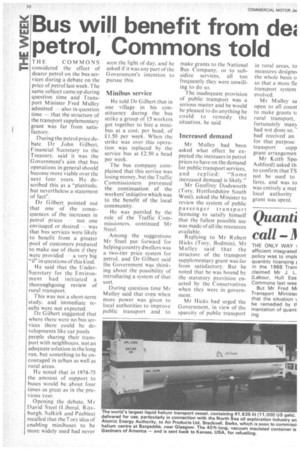Bus will benefit from del petrol, Commons told
Page 12

If you've noticed an error in this article please click here to report it so we can fix it.
THE COMMONS considered the effect of dearer petrol on the bus services during a debate on the price of petrol last week. The same subject came up during question time and 'Fransport Minister Fred Mulley admitted—also in question time — that the structure of the transport supplementary grant was far from satisfactory.
During the petrol price debate Dr John Gilbert, Financial Secretary to the Treasury, said it was the Government's aim that bus operations in general should become more viable over the next four years. He described this as a "platitude, but nevertheless a statement of fact".
Dr Gilbert pointed out that one of the consequences of the increases in petrol prices not one envisaged or desired — was that bus services were likely to benefit from a greater pool of customers prepared to make use of them if they were provided a very big "ir in questions of this kind.
He said that the UnderSecretary for the Environment had initiated a thoroughgoing review of rural transport.
This was not a short-term study, and immediate results were not expected.
Dr Gilbert suggested that where there were no bus services there could be developments like car pools people sharing their transport with neighbours, not an adequate solution in the long run, but something to be encouraged in urban as well as rural areas.
He noted that in 1974-75 the amount of support to buses would he about four times as great as in the previous year.
Opening the debate, Mr David Steel (L iberal, Roxburgh. Selkirk and Peebles) recalled that the Tory idea of enabling minibuses to be more Widely used had never seen the light of day. and he asked if it was any part of the Government's intention to pursue this.
Minibus service
He told Dr Gilbert that in one village in his constituency during the bus strike a group of 15 workers got together to hire a minibus at a cost, per head, of €1.50 per week. When the strike was over this operation was replaced by the service bus at £2.50 a head per week.
The bus company complained that this service was losing money, but the Traffic Commissioners prevented the continuation of the workers' initiative which was to the benefit of the local community.
He was puzzled by the role of the Traffic Commissioners, continued Mr Steel.
Among the suggestions Mr Steel put forward for helping country dwellers was a two-tier price system for petrol, and Dr Gilbert said the Government was thinking about the possibility of introducing a system of that sort.
During question time Mr Mulley said that even when more power was given to local authorities to improve public transport and to make grants to the National Bus Company, or to subsidize services, all too frequently they were unwilling to do so.
The inadequate provision of public transport was a serious matter and he would be pleased to do anything he could to remedy the situation, he said.
Increased demand
Mr Mulley had been asked what effect he expected the increases in petrol prices to have on the demand for public transport services, and replied: "Some increased demand is likely."
Mr Geoffrey Dodsworth (Tory, Hertfordshire South West), asked the Minister to review the system of public passenger transport licensing to satsify himself that the fullest possible use was made of all the resources available.
Replying to Mr Robert Hicks (Tory, Bodmin), Mr Mulley said that the structure of the transport supplementary grant was far from satisfactory. But he noted that he was bound by the statutory provision enacted by the Conservatives when they were in government.
Mr Hicks had urged the Government. in view of the sparcity of public transport
in rural areas, to measures designei the whole basis o so that a more fle transport system evolved.
Mr Mulley sa open to all count to make grants tc rural transport, fortunately many had not done so. had received an for that purpose transport supp grant arrangemen Mr Keith Spei Ashford) asked th. to confirm that TS not be used to fares, and was to was entirely a mat local authority grant was spent.




































































































